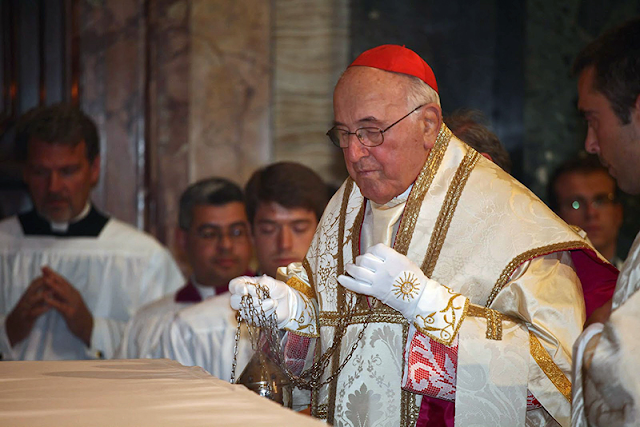Cardinal slams modernist madness of Synod and the heretics and heresy there represented
A story within a story. Waiting, knowing the weeds, hoping and waiting with patience
In this crisis of faith there would have been a need for teachers and shepherds who, with a solid knowledge of the authentic teaching of the Church, could have shown the believers the right path. By Cardinal Walter Brandmüller
Well, the Frankfurt “Synodal Way” belongs to history. Decisive things for the future of the church in Germany will depend on whether or not he makes history. A historical appreciation of this company is not yet possible. However, individual aspects are visible.
Let us first wait for the bishops, who were given a position from the outset by the statute of the Synodal Way that was incompatible with their office and mission. It is not easy to understand why they nevertheless took part in the enterprise instead of refusing to participate under these circumstances from the outset.
According to current knowledge, around seven of the 27 senior shepherds can be described as loyal to the authentic Catholic faith. Almost as many, namely six, have clearly proven themselves to be heretics, as they have repeatedly and publicly, for example, have declared and promoted the ordination of women to the priesthood, the administration of the Eucharist to persons living in adultery, etc.
Because of the publicity of such statements and because of the determination with which such theses were adhered to despite corrective papal declarations, such bishops incurred excommunication latae sententiae and thus ipso facto automatically suffered loss of office. The only question that remains is why the Holy See did not draw the conclusions from this. It may be that they didn't want to make their return journey more difficult.
Now quite a few are asking how such a situation could have come about that threatens the existence of the church - here we are only talking about Central and Western Europe. When attempting an answer, a look at the year of birth of the German-speaking bishops in office today may suffice. The eldest of them, born in 1948, was just twenty years old when the angry storm of protest against Pope Paul VI broke out at the Essen Catholic Day in the “revolutionary year” of 1968. raged, whose encyclical Humanae vitae, among others. had established the moral impermissibility of artificial birth control. At that time there were only two German moral theologians who defended the encyclical. Most of the German bishops were still students at that time, when – at least in German-speaking countries – it was often no longer possible to speak of a theology that was as scientifically high as it was faithful to the Magisterium. Anyone who dared to speak about the Trinity of God, the divinity, the resurrection of Jesus Christ, the virginity of Mary, etc. was ostracized in the guild and was at best laughed at with pity.
The great, comprehensive work by Georg May, 300 Years of Believing and Unbelieving Theology, 2021, shows the extent to which faith fidelity and scientific quality had collapsed.
German theologians – including the young Joseph Ratzinger – played an important role at the Second Vatican Council. But the blossoming of German theology that had developed after the end of the World War soon withered.
But what does this result in? Many, if not the majority, of the bishops in office today came to office and dignity with an incomplete, if not erroneous, training and were called to be teachers of the faith at a time when the foundations of Christianity have long been questioned . How could a bishop who lacked the solid knowledge of dogma and morality imparted in classical theological studies - how could he not have become insecure in the confusion of theories, approaches and opinions?
After all, he may have feared that he would be counted among the “forever yesterday” if he did not give in to the urging of those who believed that they were marching at the forefront of progress. Given the aggressiveness of a pressure group of church officials who were laymen in both senses - that is, neither theologically educated nor ordained - who would be able to resist their pressure?
In this crisis of faith there would have been a need for teachers and shepherds who, with a solid knowledge of the authentic teaching of the Church, could have shown the believers the right path. Because this was lacking, the loss of faith and the number of people leaving the church reached dramatic proportions.
In this more than worrying situation of the Church in the German-speaking area, the “Knights of the Absolute” may now demand tough intervention from the Holy See, etc. But: what would the consequences be?
The Lord shows a better way with his parable of the weeds in the wheat (Mt 13, 24ff.), with which Jesus teaches his disciples a wise lesson: How should a farmer deal with the weeds in his field which, while he slept, an enemy had sown?
Jesus' answer is timelessly valid: He curbs the zeal of the servants who wanted to pull out the weeds and burn them. "Let both grow until the harvest, lest you pull up the wheat with the tares." Then let them gather the tares and burn them, but put the wheat in the barn.
Even today, even clear, consistent action does not naturally lead to the goal. It is necessary to wait for the kairos, the right moment, knowing about the weeds, hoping and waiting in patience. Patience, however, is not resignedly letting things take their course, but faithfully bearing the burden and heat of the day under the weight of the moment in the hope of heaven's intervention. "Maranatha! Amen, come Lord Jesus!".










.jpeg)

Comments